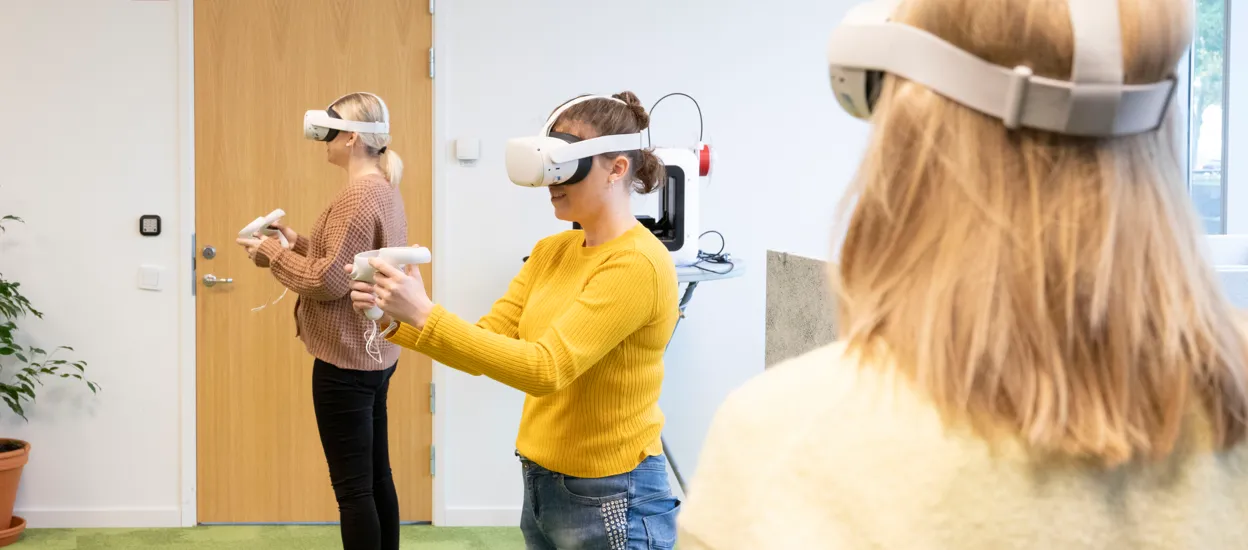
Master's Programme in Experience Design
Experience Design is about creating meaningful and engaging experiences with interactive technologies. The Master's Programme in Experience Design prepares you to design experiences that connect people, places, products and services in socially responsible, ethically sound, and technologically sophisticated ways. If you aspire to shape how people will live more sustainable lives, interact with AI, use IoT devices, or immerse themselves in VR or AR, and wish to advance your practical and academic design skills to make a positive societal impact, this education is for you.
Education occasions
About the education
Experience Design is concerned with how people use, should use, or do not use products and services in the larger context of their lives, and the Master’s programme in Experience Design prepares you to design meaningful, ethical and sustainable experiences with interactive technologies. Experience designers take the broader context into account and design experiences that make sense and make what's complex clearer, without side-stepping any ethical, environmental, and sustainability questions.
The Master’s programme in Experience Design is uniquely focused on developing the critical thinking skills and the design skills so that you can successfully address the ambiguity and uncertainty of current industry and social challenges by means of a thoughtful and reflective design practice.
Courses and competencies in focus
The Master‘s programme in Experience Design adopts three guiding principles to develop competence in design practice and in academic design research:
- Show rather than tell: you are encouraged to sketch, make, and prototype as a way to ideate and communicate and are assessed based on your design work and not only on your written or verbal communication skills.
- Balance theory and practice: theory becomes valuable when properly applied, and application is better if it has solid foundations. That’s why all courses connect theory to design practice in both classroom activities and research-based projects.
- Make, learn, reflect, document: all courses take you through a full design process, from idea to prototype, so that they all contribute to a portfolio that demonstrates design skills to prospective employers.
The Master’s programme in Experience Design is structured with teaching content and assignments that reinforce the foundational design skills of understanding people, ideation, prototyping, and evaluating. The education then expands on these design fundamentals by introducing advanced topics such as Research Through Design, Speculative Design, Design Ethics, Game Making as Prototyping, and Human-centered AI.
The education is taught in English.
Innovative environments and methods
The Master’s programme in Experience Design equips you with the theoretical and practical knowledge, and the methods and tools, to create meaningful and impactful people-centered experiences. It leverages design ethnography as a way to know who are the people to design for, build empathy, and understand the relationships between context, people, and technology. Approaches like design thinking, design ethics, research through design, embodied design, and game-making are core to the curriculum. You apply these approaches, methods, and tools in collaborative settings with industry partners, addressing real-world challenges such as those posed by human-centered AI and designing sustainable, inclusive communities and livable places and cities in which digital and physical space blend thoughtfully.
Collaboration opportunities
The Master's programme in Experience Design is closely integrated with Halmstad University’s design hub, REBEL, and many of the REBEL researchers teach in the Master’s education. REBEL brings together companies and university researchers and students will have many opportunities to actively participate in these activities. For example, during the design studio course and thesis work, students will be able to apply design skills in industrial and academic projects.
After the education
Degree
The programme leads to a Degree of Master of Science (120 credits) with a major in Informatics.
Career
After graduating from the Master's Programme in Experience Design, you are well equipped to work in positions such as:
- UX designer
- User Researcher
- Product Designer
- UX specialist
- Information Architect
Many technology companies employ these roles to design successful products and services. Since this education focuses on you developing your own, strong portfolio for the duration of the programme, this is a concrete way to improve your employment chances.
Opportunities for further studies
After the programme, students are qualified to apply for doctoral and PhD studies. If you choose this career path, you may be invited to extend your portfolio to include authorships in academic publications connected to their graduation work or to ongoing design research at Halmstad University to make you more competitive for PhD positions.
Instructions for the application
Portfolio Submission
Applicants can submit an individual portfolio of their design work as part of the application package. Portfolios are mandatory for applicants that do not have 15 ECTS in design courses or equivalent, and optional for other applicants.
- Portfolios can be submitted as pdf files (max 50MB) during the application process at universityadmissions.se (in English) or antagning.se (in Swedish) or
- Portfolios can be submitted as links to a website or online repository. If this is the
case, applicants should add the link to their application documents and make
sure that it is clearly labeled and visible, and that the portfolio is accessible (no
passwords or need for user accounts) - We welcome portfolios that illustrate design outcomes, design rationale, and
design process.
Please note that above information is subject to necessary decisions being made.
Contact
- Questions about entry requirements, selection and admissions – Contact the Student Affairs Department
- Questions about the content of the education – Contact the Programme Director: Contact details can be found in the education information box.
- Questions regarding studies and career opportunities – Contact Study and Career Guidance

